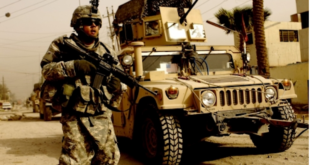NOUAKCHOTT — After 20 years of oppression under the previous regime, the people of Mauritania have welcomed the arrival of their new leader after a bloodless coup in the country.
Nouakchott is bleached by the Saharan sun and smothered in the desert sands on a daily basis.
It is a nomad’s capital where even the tallest buildings look like they could be folded up and packed away.
The Moors — Mauritanians of Arab-Berber descent — roam the streets dressed in drahas, cloaks the colour of a hard blue sky.
Some drive the latest four-wheel-drives from America, nudging the donkey carts of the black African Mauritanians off the road.
Others find a use for the petrol stations popping up around town by tethering their goats to the pumps at night. The Moors were nomads, just one generation ago. After two years of reporting from Mauritania on and off, I can read their age from the sun-etched lines on their faces, but their thoughts remain a mystery.
They are as inscrutable to outsiders as the Sahara is unnavigable.
Perhaps I should not have been surprised then to leave a country, where the only thing people did loudly was proclaim their adoration for the president, and return just a few days later to find them celebrating his downfall.
“We’re free! The dictator is gone,” people shouted in the street. At dusk young Mauritanians piled into cars and snaked their way through the capital beeping their horns and shouting with joy.
A group of army colonels had seized power in a bloodless coup and promised to hold free and fair elections within two years, in which they would not stand.
It was, said a fact-finding mission from the African Union, a coup with a national consensus.
Having known Mauritania under the stifling rule of Maaouiya Ould Sid’Ahmed Taya, it was incredible just to witness Mauritanians trying out their new-found freedom of expression.
But rent-a-crowd demonstrations are common here.
And when those expressing themselves the loudest are the stalwarts of the ousted president, you have to wonder.
Even the fallen president’s own party faithful took all of three days to abandon him and throw their full support behind the new military council.
“We’re nomads,” one senior party member told me. “We move from place to place and set up home wherever it’s convenient. We’re nomads in politics too.”
Other Mauritanians are less romantic in their assessment.
“They call us the nation of a million poets,” said one man. “We should be called the nation of a million hypocrites.”
Mauritania’s nomadic traditions are plain for all to see.
City Moors still prefer to sleep in a tent or better still directly under the stars.
Even the most opulent houses in Nouakchott have living rooms with hooks in the ceiling so tents can be set up in the home.
Tent life is public, there is no shutting doors to get away from someone you are cross with.
But life in the desert is so harsh and resources so scarce that the nomadic population simply could not afford to indulge in conflicts.
And so a million rules of social engagement sprang up to keep the peace among these proud desert tribes.
One of the most sacred is that confrontation must be avoided at all costs.
Lose your temper with a Mauritanian and your indiscretion can never be forgotten. It is far worse in Mauritania to accuse someone publicly of being a corrupt liar than to actually be a corrupt liar. It is an unacknowledged nomadic principle of peace before truth.
Mauritanians are so delighted that recent coup took place without any bloodshed that they are willing to overlook the fact that the country’s new ‘hero president’ was a senior figure in the old regime.
Not every desert habit has travelled well.
The delicious tradition for poetry recited on the dunes has turned to somewhat saccharine and nauseating flattery in the city.
“This is Sidi so and so,” goes an introduction in modern Mauritania.
“He is the wisest man in all the land, the bravest of the brave, blessed with much intelligence.”
Sidi will, meanwhile, look at the ground with mock modesty until it is his turn to return the compliment and tell you of the other man’s princely intellectual attributes.
And so it goes on until you find yourself wondering if they think you are a member of the Nobel Prize committee sounding out possible nominees.
The mistake the ousted president made, say Mauritanians, was to actually believe all this hyperbole.
Now Mauritanians are being told the cult of personality as a system of government is over.
Well, shopkeepers and office workers have pulled down the once obligatory portrait of the ousted president.
They are so pleased with their new freedom that they clutch a picture of the new man to the chests.
After all, he is the one who brought them all this liberty.
He is, any Moor will tell you, the wisest of men, the bravest of the brave.
 Eurasia Press & News
Eurasia Press & News



